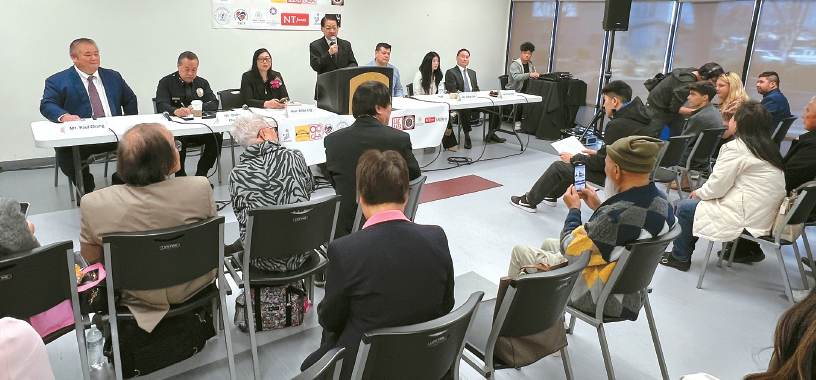“Three years ago at this time, a gunman opened fire at a spa in Atlanta, Georgia, killing eight people, six of whom were Asian women, and the Asian Pacific Islander community was deeply shocked. Three years later, we must ask what we have learned since that day.”
At 10 a.m. on March 16, more than 60 people gathered in the Rosemead Community Recreation Center (RCRC) auditorium to remember the victims of the Atlanta shooting with a minute of silence.
On the third anniversary of the Atlanta spa shooting, 10 organizations, including the Anti-Asian Hate Crimes Coalition (AHCC) and the Asian Youth Center (AYC), held a panel discussion titled “The Remembering: Atlanta Victims & Local Hate Crime Victims.”
Prior to the panel, attendees held electronic candles provided by the organizers to remember the victims of the Atlanta spa shooting three years ago. The suspected shooter, Aaron Long, went on a shooting spree at spas owned by Koreans and other Asians.

“Let us not forget the victims of hate crimes, and let us act together to prevent their repetition,” the participants said, noting that discrimination and violence against the Asian community continue, especially after the COVID-19 pandemic. They emphasized the need for the Asian American community to work together with other communities and law enforcement to stand up against hate crimes.
“It’s important to report what happened when you are a victim of or witness a hate crime,” said moderator Mike Eng, a retired California Assemblymember. “So that the community and law enforcement, including the police, know what happened so that it doesn’t happen again.”
The panelists also urged the Asian American community not to remain silent in the face of hate incidents or hate crimes. Hate incidents include verbal abuse and gestures related to race, religion, and sexual orientation. It is a hate crime if it involves assault, weapons, or injury with a physical threat.
“Hate incidents have been around for as long as my brother and I can remember being racially profiled at school growing up,” said LAPD Assistant Chief Blake Chow. “At the time, we didn’t realize the severity of the situation, but today is different. The LAPD regularly trains officers on what hate incidents and crimes are and how to respond,” he said.
“The most important thing to stop hate incidents and crimes is statistics,” says Deputy Assistant Chief Chow. “We need to have accurate statistics on what’s happening in our community so we can plan our response. If you see a hate incident or crime in your neighborhood, be proactive and report it, take pictures or videos, and let us know.”
“In 2022, there were many hate crimes against Asian Americans, but the LAPD was surprised to receive only seven reports,” said Esther Young Lim, AAPI Advisory Board Chair to the Los Angeles County District Attorney’s office. “When the Asian American community is silent, the world doesn’t know what is happening. The community and law enforcement must actively work together.”
The L.A. County District Attorney’s Hate Crimes Section has five prosecutors working on cases referred by the LAPD and the L.A. County Sheriff’s Department. Intimidation or assault based on race, religion, gender, and gender identity can result in felony charges.
“If the court finds that the crime was committed because of race, religion, gender, or sexuality, the judge can add three to four years to the sentence,” said L.A. County Deputy District Attorney Paul Kim. “The key is to have enough ‘evidence’ to convince 12 jurors. If you are a victim or witness to a hate crime, you should consider getting CCTV footage and evidence.”
There were also suggestions that the Asian Pacific Islander community should work together in an organized way to prevent hate incidents and crimes.
“We need to recognize that hate incidents and crimes are based on misinformation and emotional bias,” said Cal State LA professor Paul Chang. “In order to change the perception of the Asian community, we need to come together as a community that is currently divided. It is important for us to act together and speak with a unified voice.”
BY HYOUNGJAE KIM, JUNHAN PARK [kim.ian@koreadaily.com]




